Veterinary Science Certificate Program celebrates growth
Expanded summer camps extended education to youth across Texas, beyond
Youth with a budding interest in veterinarian careers are getting more significant exposure to the Veterinary Science Certificate Program, VSCP, of the Texas A&M AgriLife Extension Service, thanks to an expansion in available summer camps, according to Nikki Boutwell, VSCP coordinator, Bryan-College Station.
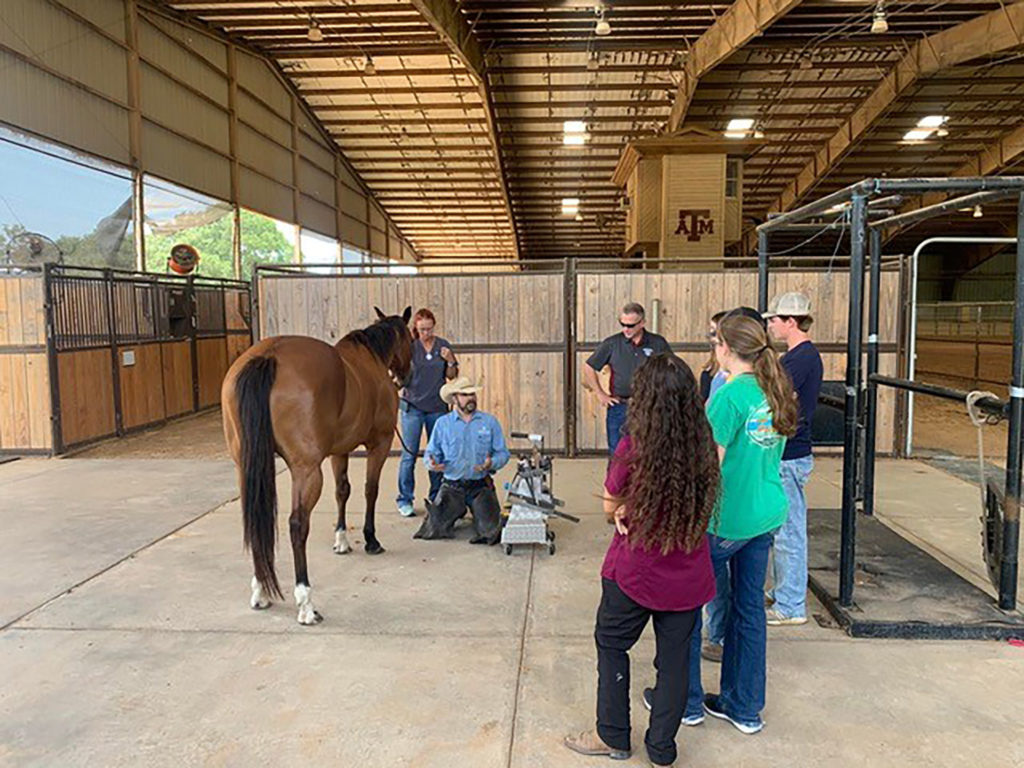
The Veterinary Science Certificate Program is a nationally recognized program designed for students interested in becoming a veterinary assistant. Participating students are typically interested in pursuing an associate, undergraduate or graduate degree in the veterinary science field.
Boutwell said her goal is to provide widespread opportunities for students who otherwise would not have access to the program. This includes expanding the program and increasing awareness of all students, parents, adult leaders, teachers and administrators regarding the distance-based education course that can lead to a Certified Veterinary Assistant certification.
“We want to get more exposure any way we can for kids and the program,” Boutwell said. “I hear people say, ‘I didn’t know this was available; I wish this had been around when I was going to school,’ and that’s what I’m trying to do – expand the availability.”
Helping her make that a reality are Susan Culp, DVM, retired and previous VSCP coordinator, and Dee Ellis, DVM, a Texas A&M AgriLife Research veterinarian in Texas A&M’s College of Agriculture and Life Sciences.
Expanding first over the summer with more camps
Boutwell said the first expansion they made was to host two additional day camps during the summer, bringing the total to four. About 50 students attended each camp.
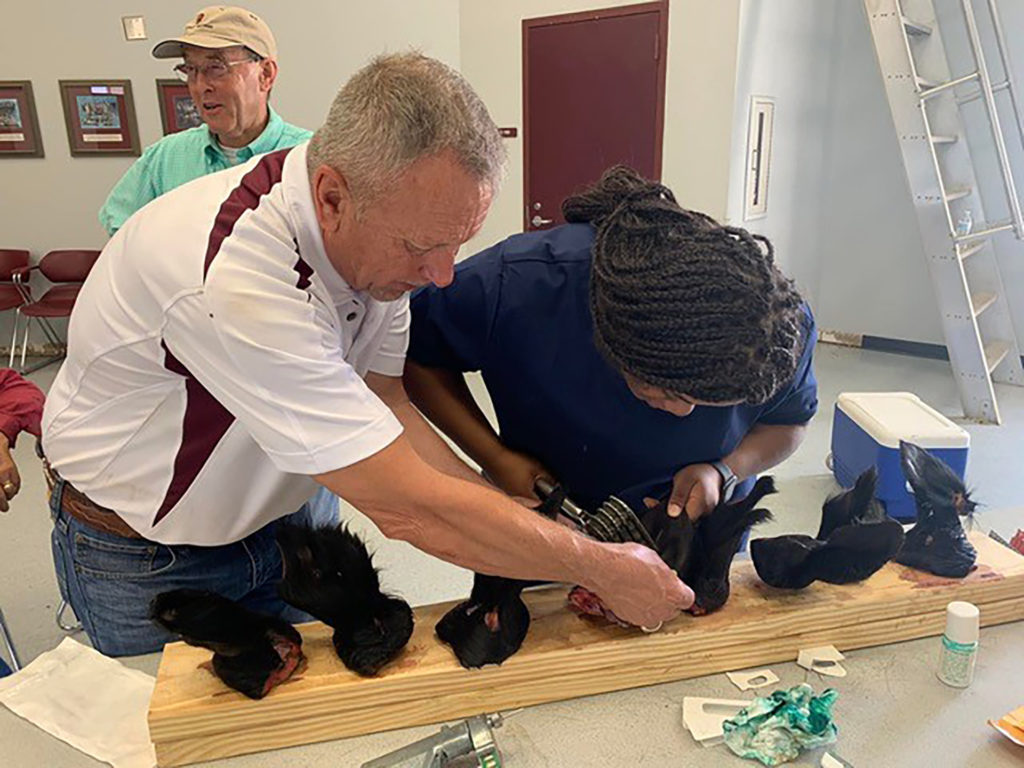
“These camps provide exposure to vet medicine for rural students who don’t have an option for the curriculum piece,” she said. “If we can grow the staff, we can grow the program. We want to try to include another location next year. We still have to turn people away, but fewer this year because we could offer more camps.”
The camps included:
• East Foundation San Antonio Viejo Ranch in Hebbronville – This camp focused on cattle, wildlife and land stewardship. Two school groups – one from Laredo Independent School District, ISD, and another from United ISD in Laredo – attended, as well as students from all over Texas. Students got custom-designed camp t-shirts for the East Foundation camp. Several veterinarians drove in to help, including Ellis, Pancho Hubert, DVM, with the Tejas Veterinary Clinic in Corpus Christi; Terry Hensley, DVM, TVMDL assistant director, College Station; and T.R. Lansford, DVM, assistant director of the meat safety assurance section with the Texas Department of State Health Services.
• McMullen County in Tilden — This camp was a collaboration with Lansford and his wife Christy Bramwell Lansford, AgriLife Extension agriculture and natural resources agent, and Amy Jo Kollman, 4-H and youth development agent, both in McMullen County. It provided the students with hands-on experience with injection methods, calf pulling and dystocia, plus enabled them to learn about veterinary instruments and career opportunities.
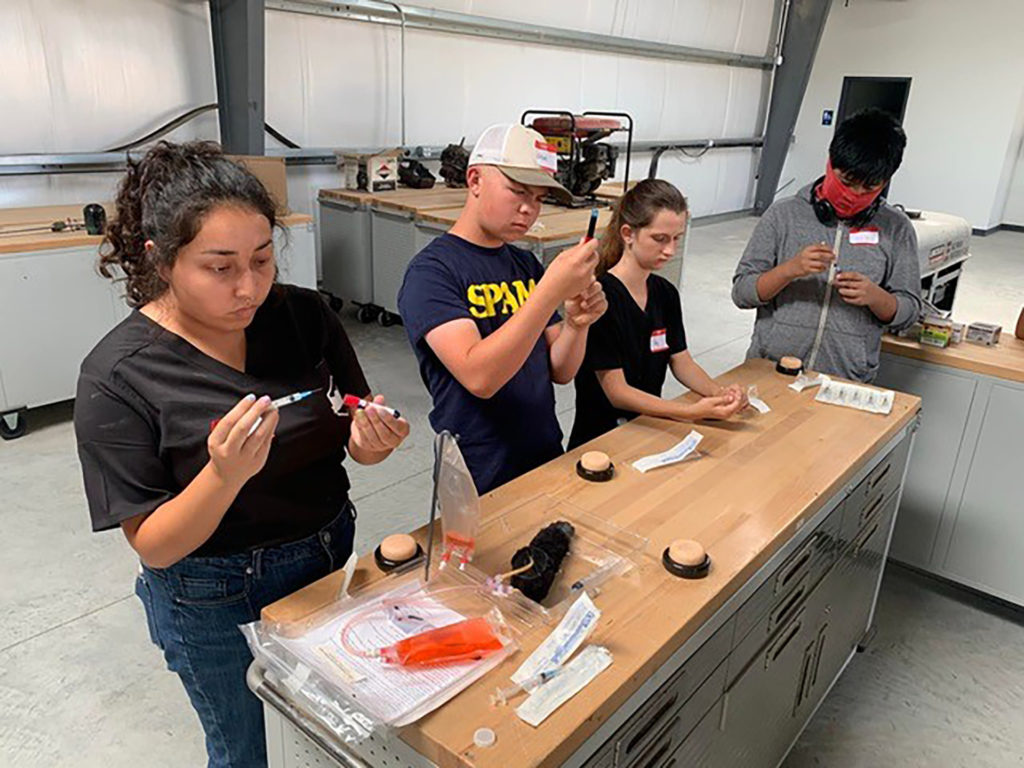
• Two of the day camps were held back to back in El Paso in early July. The plan was to only have one day camp, but the registration was sold out in two days, so Boutwell said they decided to host a second one. Schools from Hereford, Van Horn and Monahans, all the way west to Las Cruces, New Mexico, brought students to the day of learning. In conjunction with the Canutillo ISD Agriculture and Veterinary Science program, Boutwell collaborated with the AgriLife Extension team in El Paso County. Students learned about working with cattle, horses and goats. They also learned about parasites and how to use microscopes and prepare needles and syringes for injections.
Overnight camps offer unique experiences
Boutwell said they were also able to offer more intensive overnight camps to provide opportunities for students who are already working toward a vet program or as volunteers and have committed hours toward a goal of assistant certification.
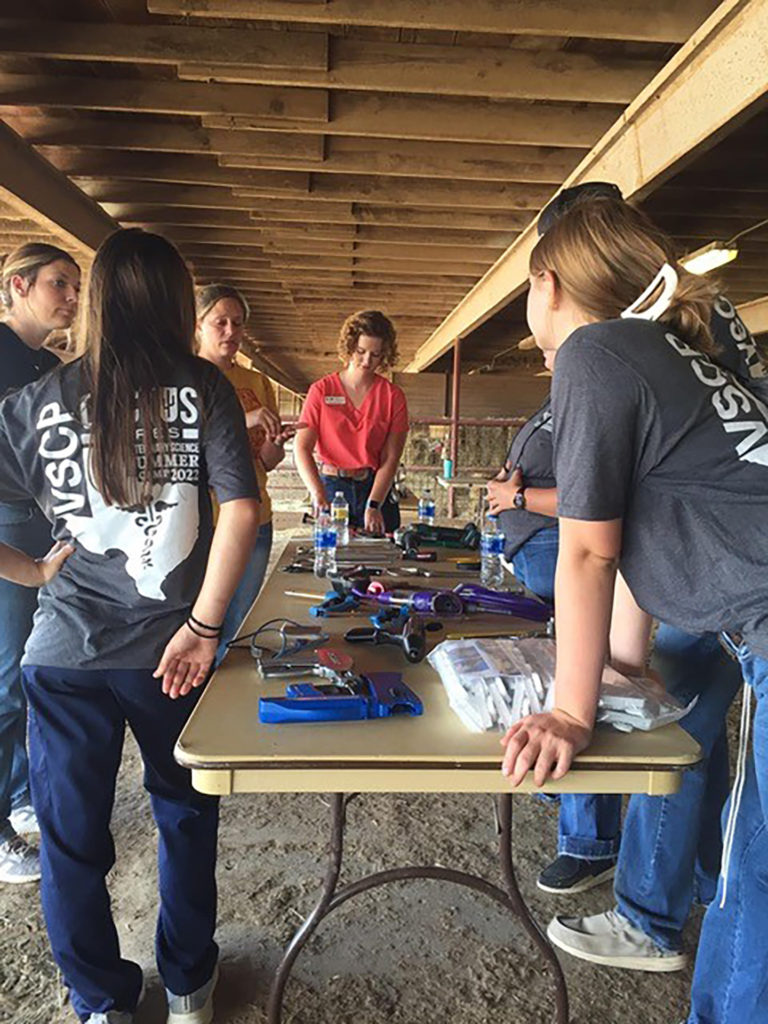
Culp said they were able to increase the overnight camps from three to six this year. The three-day, two-night camps require an application and are highly competitive. The increase helped ensure more students could access this unique opportunity. More than 400 students applied to attend one of the six overnight camps this year, with only 20-25 students selected for each camp.
The camps were held in June and July at Texas A&M University-Kingsville; Texas A&M University, Bryan-College Station; Stephen F. Austin State University, Nacogdoches; West Texas A&M University, Canyon; Tarleton State University, Stephenville; and Lone Star College, Houston.
At each camp, students received documentation of 20 hands-on clinical hours and confirmation of competency in 33 veterinary assistant skills.
All camp agendas highlighted the things that made each host institution unique. When possible, the students received campus tours and stayed in dorms.
• The Texas A&M University-Kingsville camp was held at the Veterinary Technology Campus. Students were given hands-on experience with sheep, goats, cattle and small animals, such as cats and dogs. The camp included a wildlife and large animal experience, as well as a tour of the Ceasar Kleberg Wildlife Center and the National Natural Toxins Research Center, NNTRC. The students also attended an etiquette presentation by Tammy Alcala from the Career Services Center.
• At the camp at Texas A&M, the students received hands-on experience with cattle and horses and hosted participants from as far away as South Dakota and Puerto Rico. They toured the Texas A&M University School of Veterinary Medicine and the Texas A&M Veterinary Medical Diagnostic Laboratory, TVMDL, in College Station.
• At Stephen F. Austin, the students garnered hands-on experience with horses, cattle, poultry and exotics. This camp included a tour of the university’s ag farm and equine center, as well as the Todd Agricultural Research Center and Poultry Research Center.
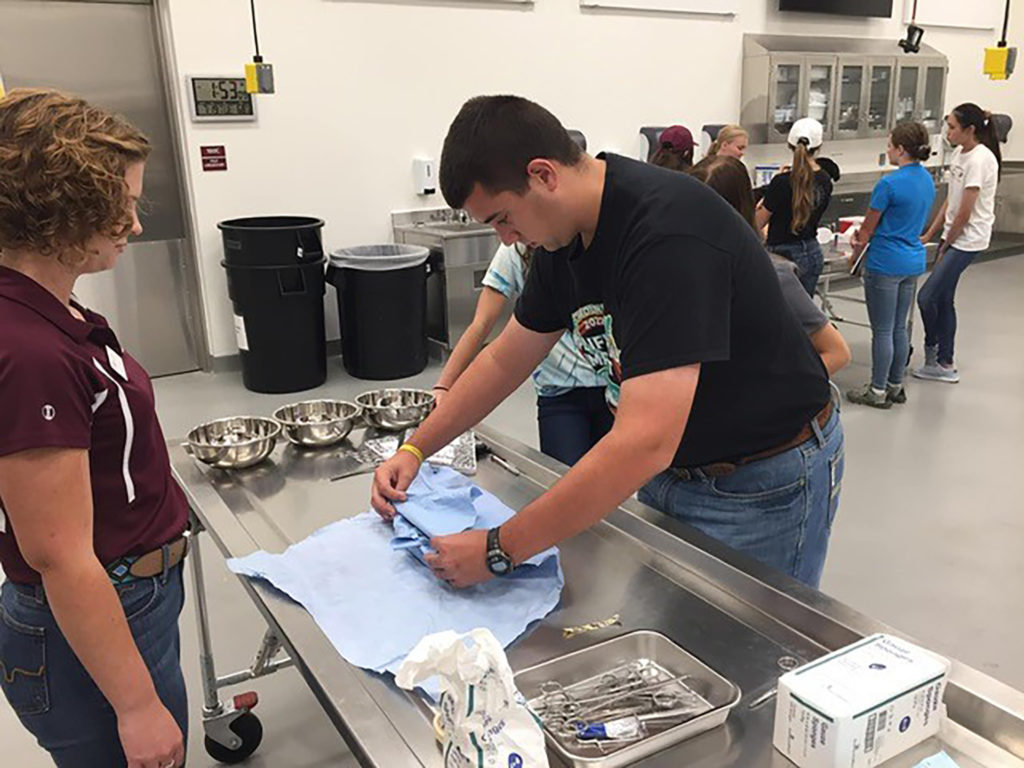
• The camp at West Texas A&M offered hands-on experience with horses and cattle, as well as a tour of the Texas A&M School of Veterinary Medicine’s Veterinary Education, Research and Outreach, VERO, facilities and a tour of TVMDL in Canyon.
• The Tarleton State University camp offered hands-on experience with sheep, goats, cattle and horses, as well as a tour of the Southwest Regional Dairy Center.
• The Lone Star College camp offered hands-on experience with horses, mules, cattle, cats and dogs. At this camp, students observed small-animal surgery demonstrations, including presurgical physical exams, premedication, anesthesia induction and monitoring, and spaying and neutering canine and feline patients. They learned about patient recovery, including pain management observation and cleaning the surgical suite and instrumentation. They also received safety training and were able to operate a hydraulic squeeze chute for cattle restraint.
Bigger and better things ahead
This fall, a day camp is scheduled in November at Fossil Rim Wildlife Center in Glen Rose. This camp will include a tour of the facility, their veterinary care center, a show and tell of darting equipment, and a panel discussion on career opportunities in wildlife, conservation, zoo medicine, conservation education and animal care fields.
In 2023, VSCP plans to offer at least eight overnight camps with the number of students limited to about 20 per camp so each student may have the best possible experience.
Christine Hoskinson, licensed veterinary technician and assistant director of Veterinary Technology, Department of Animal Science and Veterinary Technology, Texas A&M University-Kingsville, said the camps offer the youth the opportunity to practice and do some hands-on fun things in the veterinary medicine field.
“A lot of these kids are from all over Texas, so not only do they come and do a lot of veterinary skills for their certificate, for their CVA training, but also they see the whole campus,” Hoskinson said. “They stay in the dorms, go to the wildlife center, the NNTRC – you know, all the types of things that make Texas A&M University at Kingsville unique. Hopefully, that opens their eyes to the opportunities out there, specifically here at the Kingsville campus.”
The value of the VSCP camps is that they introduce the students to a variety of veterinary science career paths, introduce them to their peers that are also interested in veterinary science, and begin to prepare their pathway to successfully achieve the academic and experiential landmarks they need to complete to gain entrance into a veterinary college or to become a certified veterinary assistant, Ellis said.
T.R. Lansford said the program provides “an excellent avenue for Texas youth to explore and gain knowledge about the veterinary medical profession, and it provides opportunities for them to learn invaluable life skills such as responsibility and marketable career skills while broadening their scope of the world around them.”
He said they are already working on a day camp for 2023 that will take advantage of a rural setting to, hopefully, provide exposure to large animal elements that more urban settings don’t have as ready access to.
For more information about upcoming camps or the program, contact Boutwell at [email protected].


